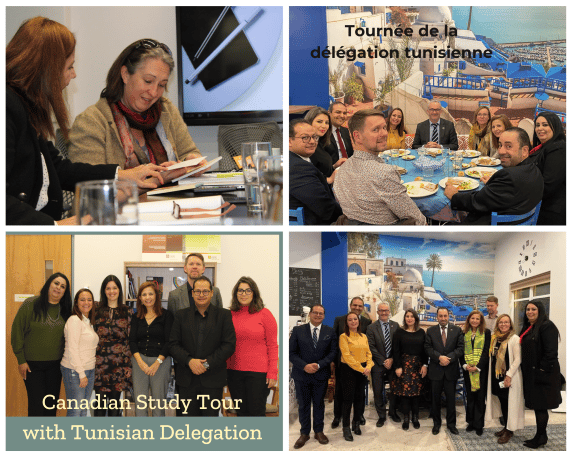TAP-EDM Tunisian Study Tour: Canadians supporting a communication strategy against gender-based cyber-violence
TAP-EDM is sharing its contribution to the “16 Days of Activism Against Gender-Based Violence” through testimonials, project initiatives and key players making a difference. This is our first post.
Conversation with Thouraya Belkahia, Director General of the
Center for Research, Studies, Documentation and Information on Women (CREDIF), Tunisia, October 2022
During a Canadian study tour, Alinea International’s Technical Assistance Partnership (TAP) met with Thouraya Belkahia, Director General of the Center for Research, Studies, Documentation and Information on Women (CREDIF) in Tunisia. She has served as the head of CREDIF for the past six months. Belkahia earned her PhD from the Panthéon-Sorbonne University in Paris in 1994. She specializes in history, Roman archeology and Latin epigraphy and has a marked interest in the changing role of women in the public sphere.
As part of the support of CREDIF by the Canadian Embassy in Tunisia, the PAT initiative supports the implementation of a communication strategy against gender-based cyber-violence that particularly affects women in the world, as well as in Tunisia. The aim of the technical assistance provided is to strengthen the scientific research and promotional skills of CREDIF staff regarding gender equality, develop a new channel for raising awareness, foster innovative solutions for institutional communications, embrace new methodological approaches and set up a scientific collaboration network. During the week-long study tour, the Tunisian delegation visited Quebec City, Montreal and Ottawa to meet with organizations focusing on these issues.
Tell us about your time here. What are your hopes when it comes to collaborating with your Canadian peers?
Ms. Belkahia’s passion for this topic was evident. Gender equality in Tunisia is something for which she and her organization have been advocating for many years. She stressed that the advancement of the status of women is a daily fight and one she takes very personally. The opportunity to meet with organizations here in Canada, whose mission is similar to CREDIF’s drove home the international impact of the work her organization does.
What are your impressions of your trip? What have you learned, and what have you enjoyed most?
Some 15 organizations, including Women and Gender Equality Canada, the Conseil du statut de la femme du Québec, the Federation of Canadian Municipalities, Université Laval’s Chaire Claire-Bonenfant — Femmes, Savoirs et Sociétés and others, were happy to meet with the CREDIF delegation. Ms. Belkahia was pleased to learn how each of the organizations was structured and learn how many associations there are that support women, including the multidisciplinary centre at the CIUSSS de la Capitale-Nationale, which provides a continuum of services to survivors of sexual assault. She said they would all be a source of inspiration for her work in Tunisia. She was interested in finding out more about the level of government involvement, the result of which is greater stability and an ongoing source of funding.
Are there any similarities between your programs, your vision and your work and what your Canadian counterparts are doing? How do you think you’ll apply what you have learned back home?
CREDIF will definitely have developed closer ties with several Canadian organizations as a result of this trip. For example, the Centre de documentation sur l’éducation des adultes et la condition féminine (CDEACF), one of the specific focuses of which is on the status of women, has suggested that discussions be held to enrich both centres’ respective knowledge. There are also partners we can work with to provide cyberviolence training. Their experience and mission could be helpful in CREDIF’s efforts to raise awareness around online bullying. In addition, Ms. Belkahia hopes to work closely with the Conseil du statut de la femme du Québec, whose example she would like to follow. The idea of intervening at a legislative level is something that resonates deeply with her.
What can Canada and Canadian organizations learn from you?
CREDIF is very active both in Tunisia and on the international stage. We contribute to discussions and partnerships to gauge the economic and social costs of violence against women. This includes our work with a number of UN organizations, including UN Women, to strengthen women’s leadership and engagement, fight gender-based violence and empower women more effectively.
CREDIF will be taking part in a number of upcoming information and promotional campaigns, including the 16 Days of Activism Against Gender-Based Violence from November 24 to December 10. Furthermore, Atypic, a Montreal-based organization, will be working with CREDIF to develop a cyberbullying communications strategy, an initiative made possible through the collaboration of TAP-EDM.

